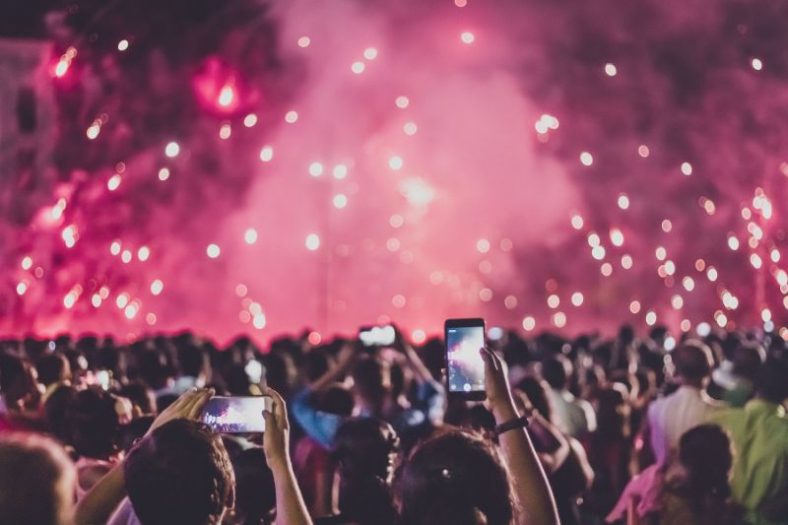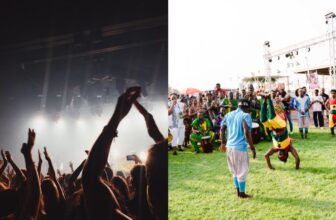What Is The Future of Music?

The future of music will be tied to technological advancements such as Artificial Intelligence (AI) and immersive 360º sound systems. It will privilege user experience and multimedia projects over conventions such as the studio album. Finally, it will pave the way for the emergence of new genres.
That’s, of course, my humble assumption. Accurately predicting the future of music is a daunting task, and it would be silly to assume that any conjecture is 100% right. However, it’s possible to analyze what’s changed in the music industry in recent years and draw some rational conclusions from it.
In other words, it’s plausible to make fact-based predictions about the future of music without assuming that such predictions are facts per se. With this careful approach in mind, let’s take a closer look at what music may look like one, 10, or 50 years from now.
Contents
1. AI technology at the core of music creation
AI technology is not a thing of the future. Whether it’s in music or any other industry, AI is a part of our contemporary world. Like all technologies, AI can transform music for better or worse. But more than making a moral evaluation of how AI can impact music, it’s interesting to explore how it will affect music creation in more concrete terms.
1.1. AI-assisted songwriting
Two is always better than one. But what if, instead of having a human partner for making music, one could count on the assistance of AI technology? AI networks work because they rely on massive databases that allow them to “make” fast decisions on the spot and come up with solutions to virtually any issue.
AI-assisted songwriting can revolutionize the way humans create music and provide them with powerful tools for enhancing their songs and improving their workflow. Need a word to rhyme with “love?” AI technology can quickly analyze millions of lyrics and feed you the most popular alternatives. Need to spice up a basic chord progression? Why not let AI work its magic instead of banging your head against the wall?
AI-based music tools are already prominent, and they’re probably not going anywhere. Even though the constant reliance on AI technology can potentially make songs sound more predictable, it should also trigger new and exciting possibilities for songwriters everywhere. After all, two is always better than one.
1.2. AI-based mixing and mastering solutions
If AI can be helpful for songwriting (which is a deeply artistic endeavor), then it should be even more useful for mixing and mastering songs. While there’s plenty of artistry to audio engineering, the fact is that there’s also a science to well-mixed and mastered tracks.
AI-based mixing and mastering solutions are a thing of the present, but I have no doubt they will continue to improve in the future. While it’s comforting to think audio engineers will never be replaced by a few lines of code (especially if you’re an audio engineer yourself), there’s enough room for AI to grow into becoming the mixing and mastering standard.
AI mastering services such as LANDR are already used by many music producers, and they happen to be very effective a lot of the time. If this type of technology continues to be developed, it’s possible to think of a future when human audio engineers will be rendered useless by faster, more affordable, and more accurate digital systems.
1.3. AI coders as artists
AI image generators are the rage. Online tools such as Craiyon can create true masterpieces by following simple text-based instructions, sometimes, to spectacular effect. Naturally, coders are trying to come up with similar tools for generating other types of art, including music. But what does this mean for the future of music?
Assuming that, one day, a Craiyon-style tool for music will be widely available, we will be entering a stage in the history of music in which coders will become a new type of artist. Their job will be to come up not with the works of art themselves (i.e., the songs), but with powerful AI networks that can generate increasingly impressive works of art.
In simple terms, the coder will be an artist-making artist. His or her job will be to develop AI systems capable of creating better songs instead of being directly involved in the creation of such songs.
1.4. The listener as the composer
In the follow-up of the idea that coders can one day become a new type of music artist, it’s impossible not to take into consideration the deep impact music-generating AI can have on listeners. If people are capable of creating original songs merely by introducing a few instructions on a website, why shouldn’t everybody make music?
This relates to the idea that music will be “gamified” in the future, and that the roles of listener and composer won’t be as well-defined as they are today. If AI takes center stage, we can imagine a world in which a never-before-heard song can be “made” in seconds by someone without any knowledge of music production.
In such a strange new world, will it be possible to distinguish between listener and composer? And where does one trace the line? These are worrying philosophical questions for the art creators of the future, but there’s no reason not to start thinking about them right now.
2. Virtual reality and 3D immersion
In an article published by CNET, the Millennia Music & Media Systems CEO John La Grou stated that sound recording will change drastically in the following decades and that, by 2050, head-worn audio equipment should “convincingly emulate any acoustic space and any room monitor technique with lifelike precision.”
La Grou’s bold prediction makes sense, especially at a time in which virtual reality is taking center stage and Facebook’s Metaverse seems to imply that the future of social media will be based on 3D-modeled digital environments. As the film and video game industries are investing in increasingly immersive experiences, why should the music industry look elsewhere?
Because the advent of virtual reality increases the demand for surround audio experiences, and because lifelike 360º sound systems seem to be a real possibility, it’s fair to imagine a future of music in which listeners can put on headphones and feel like they’re in a live concert of their favorite band.
3. Music will be made for something
In this article, I’ve mentioned that albums are dead and that the vast majority of music listeners aren’t interested in hearing a one-hour album when they can skip through multiple artists on music streaming platforms. For better or worse, this is the ‘now’ of music. But what does it mean for its future?
As technology keeps pushing forward and attention spans keep getting shorter, I expect that we will be entering a stage in which music won’t be enough. In other words, music will have to be made for something, whether it’s a movie, a video game, or one of the aforementioned Metaverse-sponsored 3D virtual reality experiences.
This prediction is based on a few trends that are evident today. For one, artists, fans, and record labels don’t seem as interested as before in creating conceptual albums or just-music experiences that last more than two or three minutes. Additionally, there’s a growing market for background music that’s not made to be listened to, but to be played while doing something else (the blockbuster genre that’s YouTube lo-fi hip-hop is emblematic of this tendency). Finally, there’s the much broader question of the algorithm…
3.1. Music algorithms as the ultimate music fan
While I don’t expect artistic integrity to die in the future, I do not doubt that the vast majority of recording artists are more than willing to adapt in whatever way they need to to make more money. And that’s where the music algorithm as the ultimate music fan steps in.
The idea is simple: because most music listeners are more than happy to tune in to whatever songs their favorite algorithm is feeding them, I expect artists to start making music not to please their fans, but to please the lines of code that run through services such as Spotify, YouTube, and Apple Music.
The purpose of music will no longer be to create an emotional reaction in humans; it will be about having the right properties to get favored by, cheat, or be benefited by algorithms. While I promised not to make moral assessments about the future of music, I don’t see anything good coming out of this trend. Music creation will be even more commodified – this time not according to the will of the masses, but to the indecipherable whim of all-ruling algorithms.
3.2. Social media
Because we live in a time in which social media networks such as TikTok are having a deep impact on how music is made, it’s impossible to ignore that social media will continue to shape the future of music. This fits into the notion that music will have to be made for something: if not a film or 3D environment, then a TikTok challenge that may or may not get viral…
Again, this prediction is based on the idea that many musicians are willing to compromise their artistic integrity for the opportunity of making more money. With so much information flying around on the Internet, I sure hope that some artists and fans will continue to value the experience of listening to music just because of the music, without the need for any additional support.
4. An economy of presence
Here’s a striking question: if not by fooling algorithms and trying to get viral on social media, how will the artists of the future make money? In face of such a compelling enigma, my prediction is that the way musicians make most of their income won’t change in the future. In other words, artists’ income will continue to be based on an economy of presence.
This concept (economy of presence) was introduced by Hito Steyerl in the book “Duty Free Art” (2017) and refers to the way modern-day art is monetized not by the exchange of objects, but by the exchange of presence, i.e., of “people being there.” It’s the philosophical equivalent of stating that music fans don’t buy records anymore, so artists have to make ends meet with live shows.
Steyerl justifies this economy of presence quite brilliantly by stating that “In the age of reproducibility of almost everything physical, human presence is one of the few things that cannot be multiplied indefinitely, an asset with some inbuilt scarcity.” Later on, she adds: “Interestingly enough, the demand for total presence and immediacy arises from mediation; or more precisely from the growing range of tools of communication, including the internet. It is not opposed to technology but its consequence.”
To sum it up, and backed by Steyerl’s well-put arguments, I believe that we will continue to live in a world in which artists will only be able to make money by capitalizing on the presence of their fans. As the Internet makes pretty much all art available to pretty much everyone via digital reproduction, artists’ income will most likely depend on live shows, special meet-and-greet events, exclusive content, and so forth.
5. New music genres
If predicting the future of music based on technological advancements and market trends is hard enough, what to say about the impossible task of predicting the new music genres to come?
If knowing what’s going to be hot in the next year, decade, or century was easy, then everybody would do it. I will, nonetheless, attempt to predict the rise of at least two new types of music genres – one based on what’s happening with hyperpop music right now, and another based on the cyclical tendency musicians have to go against the norm.
5.1. The continuation of the hyper movement
Hyperpop is one of the hottest music genres in the world right now, fueled by the popularity of artists such as 100 gecs, Dorian Electra, GFOTY, Charli XCX, and the late SOPHIE. Albeit inspired by Bubblegum Bass, it’s basically defined as Dance-Pop music on steroids – all the traditional pop elements are grossly exaggerated to the point of sounding distinctively new.
I believe that the hyper-movement will continue and that it will affect genres other than pop (such as dynastic’s hyper-emo) because it’s a movement perfectly suited for the short-attention-span world in which we live today. All hyper music is made to shock, to stand out from the rest, to cause a visceral reaction in the listener, and to avoid all subtlety.
While not all music listeners will fall in love with the hyper movement, I do believe that there’s room for hyper-artists to step into the mainstream. The recent popularity of K-Pop (a genre with a hyper-like habit of overdoing things) is a solid argument in favor of this prediction.
5.2. Anti-electronic genres
You won’t find any music prediction on the Internet stating that electronic music’s done with. I agree that the vast majority of the music of the future will be made digitally. However, the history of music in the 20th century has taught us that, for every musical movement there is, an anti-movement must appear.
It happened with punk rock in the 70s, which was the opposite reaction to the spirituality and love-first mindset of the music of the hippies (psychedelic rock, spiritual jazz, and so forth). It happened with no-wave and post-punk in the 80s, the opposite of the everybody’s-happy pop tunes that flooded the radio at the time. It happened even inside the niche of electronic music in the early 2000s, back when artists of the likes of Autechre and Alva Noto were trying to react to the emotional electronic music of Boards of Canada by coming up with utterly human-less glitch compositions.
There are many more examples to explore, and it would be tiring to list them all. However, the idea is that, as electronic music will continue to grow in popularity, niche anti-electronic movements will follow.
Conclusion
Thinking and writing about the future of music was quite a ride! Hopefully, these predictions are based on solid, fact-based notions and not just the deranged visions of a madman… Either way, I sure hope they will at least inspire you to consider what’s about to come in the world of music and draw your own predictions about its future.





